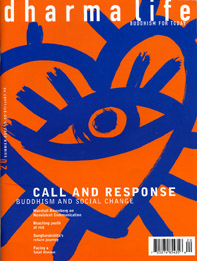Faith
Trusting Your Own Deepest Experience
Sharon Salzberg
Riverhead Books 2002, $22.95/£13.95 h/b
This is a personal, autobiographical exploration of faith from the point of view of a contemporary American Buddhist woman. It follows the development of faith from its initial stages, which Salzberg calls 'bright faith', through 'verifying faith', to 'abiding faith', the state where one's confidence in the Dharma becomes unshakeable. Along the way it takes in issues of fear, despair and faith in action.
The most engaging and authentic chapters are the first and the last two. Here Salzberg uses stories and snapshots from her own life, such as her moving account of the early loss of her parents, or the sad moment of witnessing prejudice against a friend, to emphasise her understanding of life's inherent suffering (dukkha). Throughout the book Salzberg's honest communication of her feelings, failings and experience of faith reveal a woman powerfully committed to the Buddhist path, in particular to the path of meditation, as a means of alleviating this suffering.
Salzberg makes frequent mention of her teachers, including among others S. N. Goenka, Chogyam Trungpa and Ram Dass, and of the friends of her generation of American Buddhist teachers – like Joseph Goldstein and Jon Kabat-Zinn. Salzberg communicates her intense devotion to her teachers vividly and, once again, very honestly. Her account of her Tibetan teacher, Khenpo, shines out as a delightful and inspiring description of a person radiant with spiritual maturity. She is also frank about her failings as a practitioner and a disciple: her emotional dependence on her teacher and her insecurities about getting things right.
My reservations about the book were mainly in connection with the three chapters in the middle: 'Verifying Faith: Claiming the Right to Question', 'Faith and Fear' and 'Despair: the Loss of Faith'. I felt these chapters lacked the conviction and intensity of the others. Aside from a useful discussion on the place of women in Buddhism, her explorations of the process of questioning assumptions and losing faith are disappointing. At times recourse to the language of 'opening our hearts', and 'deepening awareness of life's mystery' loses its suggestiveness, and starts to seem vague, even sentimental.
Faith is a thoughtful personal reflection on its subject, and though perhaps more rewarding for those relatively new to Buddhism, it is worth reading for its frankness and intimacy, as well as for its inspiring glimpse - and this is what impressed me most - of Salzberg's honesty and sheer dedication to the Dharma.
Padmavijaya is involved in a number of Buddhist arts projects. See his paintings at www.redlotusarts.co.uk



